It is a natural instinct of a woman to want to become the ideal, if not perfect, mother. This is one of the reasons why a woman is inclined to take special care of herself once she finds out she has conceived. A pregnant woman is naturally inclined to do what’s best for her baby.
Apart from doing away with habits that are detrimental to her health such as smoking or the consuming of alcohol, pregnant women are advised to pay special attention to the nutritional needs of her body for in doing so, she will also be ensuring the health and well being of her unborn baby. Folic acid, iron, and calcium are highly recommended as part of a pregnant woman’s health supplement. Apart from that, good and beneficial bacteria such as probiotics are also recommended for the health and well being of both mother and fetus.
The first 1,500 days
The dietary habits of a pregnant mother are capable of influencing the health and development of her baby especially for the first 1,500 days of the baby’s life. Good nutritional intake or the lack of it thereof will have a significant impact on a baby’s life.
Hence it is crucial that a mother takes special care of her health throughout her pregnancy and even while breastfeeding. It is during this window of time that important physical and mental developments take shape in a baby’s life.
Pertaining to this fact, the human gut is not only important for absorbing nourishment for the body, but it’s also the first line of defense in terms of immunity and fighting off diseases for the rest of one’s life beginning from the moment of birth. In short, it is important that a newborn successfully establishes a healthy gastrointestinal tract (GI at) at birth itself. If a newborn’s GI is not strengthened, it will not only mean a weak defense system but also a less efficient capability to absorb the nourishment needed to grow and develop healthily.
In line with this fact, experts agree that the impact of a mother’s nutritional intake on the health and development of her baby is not to be ignored. Proper nutrition, even from pregnancy, will ensure a bigger possibility of a baby being born healthy and well-developed.
Health issues that are bound to arise during pregnancy include constipation, heartburn, and urinary problems. Foods and drinks rich in probiotics such as yogurt and cultured drinks can help in reducing if not eliminating these uncomfortable conditions.
It is highly recommended that a pregnant mother who does not consume probiotics-rich foods take some dietary supplements that contain this important nutrient for it is not only beneficial for her but her growing fetus as well. Indirectly, the probiotics consumed during pregnancy are capable of reaping positive results health-wise for a baby for the first 1,500 days of life.
Do probiotics help?
Research has proven that consuming probiotics-rich food assists in resolving many health issues brought about by pregnancy by adding on to the ’good’ bacteria in the mother’s gut. This ultimately bears good positive results in the well-being of a pregnant woman and her baby for the immunity levels during pregnancy is sometimes challenged and vulnerable.
What do probiotics do
The human intestinal bacteria colony forms a major part of our protective barrier and protects us from harmful disease-causing bacteria and viruses.
Good gut bacteria, when established in the human body early in life, provides the initial and largest source of protection and stimulation needed by the body to grow and function at its best. Genetics may have something to do with how this essential human intestinal bacteria colony affects one’s well-being. How a baby is born (vaginally or via C-Section) also counts, as well as early feeding strategies.
Probiotics are known to promote overall good health and maintain a healthy digestive tract where else a lack of probiotics in a human body would prove detrimental to health, rendering the digestive tract weak and the body vulnerable to allergies and may even lend a hand in the onset of obesity.
A promising future
In a study by renowned child specialist from the University of Turku, Finland, Dr. Erika Isolairi on probiotic supplements, an important function of this good bacteria was discovered, namely its ability to influence the metabolism of carbohydrates. This points to the fact that probiotics may have the capability to control gestational diabetes and obesity during and also after pregnancy.
The benefits of probiotics are many and promising, but not everyone is aware of the importance of these bacteria in the human physical system. If supplements were to be taken, requirements and doses vary from person to person hence consultation with your doctor would be necessary.
More awareness is needed so a pregnant mother may make informed choices in dietary supplements that are beneficial to her baby and herself, including probiotics supplements.
The benefits of probiotics are as follows:
- Reduces one’s intolerance towards lactose
- Aids indigestion
- Aids in the absorption of minerals
- Helps in the production of essential vitamins needed in the body
- Relieves diarrhea
- Strengthens the immune system
Get into a probiotics-rich diet
Healthy, beneficial probiotics can be found in a variety of foods. Here are some foods to incorporate into your diet to help you acquire the probiotics you need to stay healthy and for a healthier pregnancy.
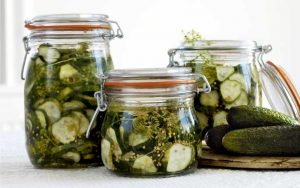
Pickles: Any kind of pickle boasts the same briny goodness and probiotic potential.
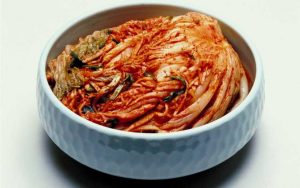
Kimchi: A healthy, Korean condiment made from fermented vegetables
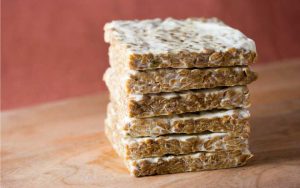
Tempeh: Slabs of fermented, probiotic-rich grain made from soybeans
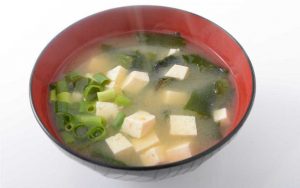
Miso soup: One the mainstays of traditional Japanese diets made from fermented rye, beans, rice, or barley. Commonly used in macrobiotic cooking as a digestive regulator.
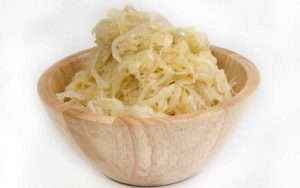
Sauerkraut: Made from fermented cabbage (and sometimes other vegetables). It’s not only extremely rich in healthy live cultures but might also help with reducing allergy symptoms.
Featured image source: Unsplash


